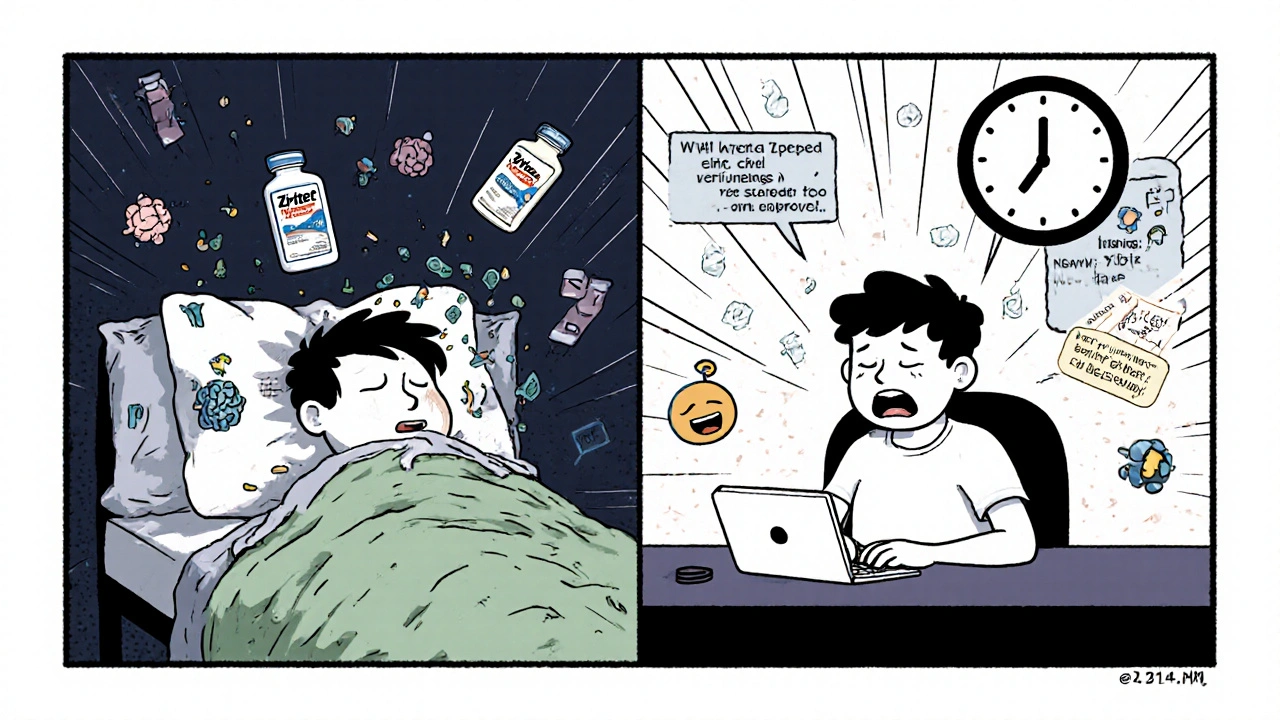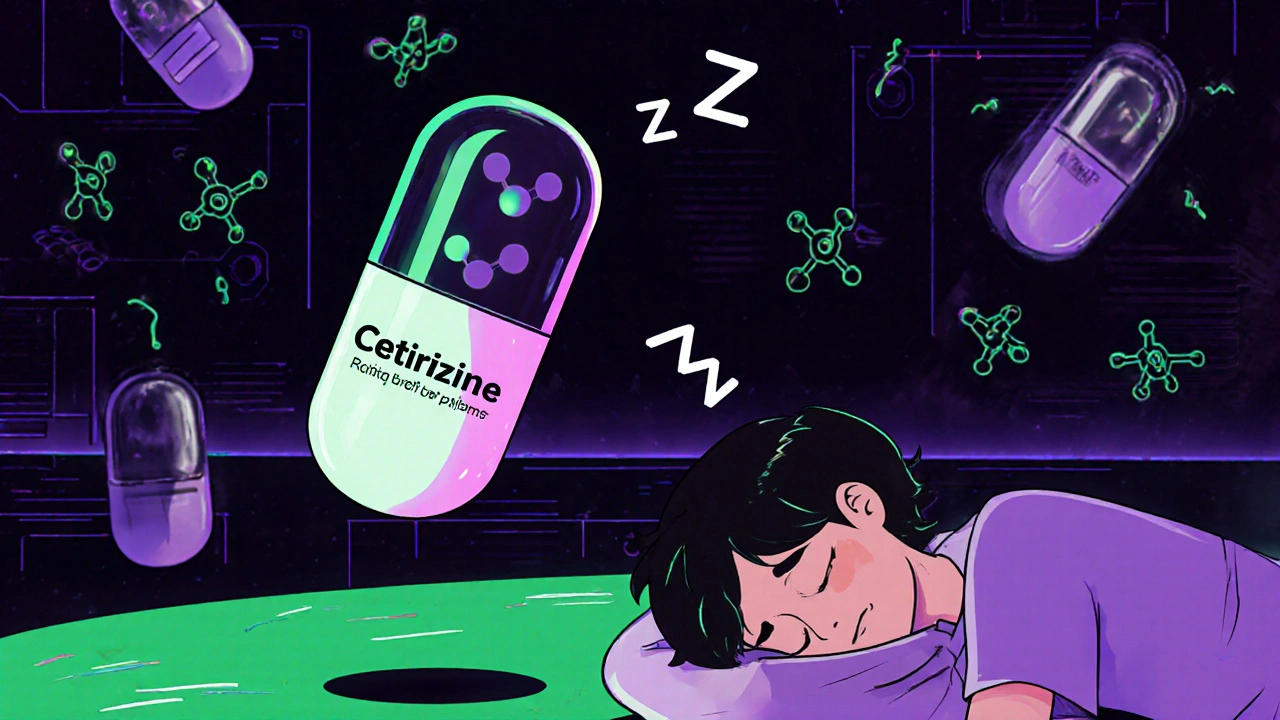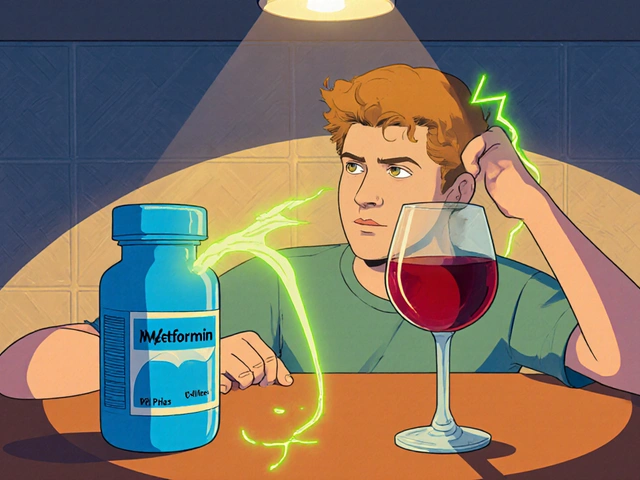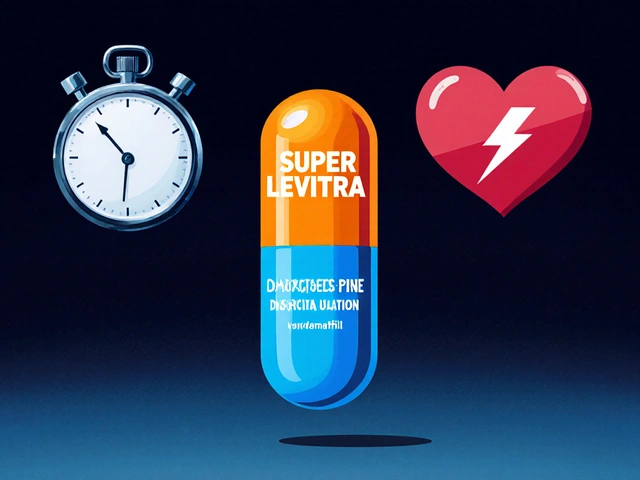Antihistamine Drowsiness Risk Calculator
This tool helps you determine which allergy medication (cetirizine or levocetirizine) may cause less drowsiness based on your individual circumstances. Based on the article: Cetirizine contains both active and inactive components, while levocetirizine is the purified active ingredient that causes less drowsiness.
Your Input
Key Information
Important fact: Cetirizine (Zyrtec) contains 50% inactive component that can cause drowsiness, while levocetirizine (Xyzal) is the pure active ingredient.
Typical drowsiness rates: Cetirizine causes drowsiness in 14% of users vs. 6% for levocetirizine. A 5mg dose of cetirizine is equivalent to 2.5mg levocetirizine.
Tip: If you've had drowsiness with cetirizine, switching to levocetirizine may reduce this side effect by about 50% while maintaining allergy relief.
What’s the real difference between cetirizine and levocetirizine?
If you’ve ever taken Zyrtec and felt like you needed a nap by 2 p.m., you’re not alone. Many people switch to Xyzal hoping for the same allergy relief without the foggy head. But is that difference real-or just marketing? The truth is, cetirizine and levocetirizine are closely related, but not the same. One is a mix of two parts; the other is just the part that works. And that small chemical difference changes how you feel all day.
Cetirizine, sold as Zyrtec, is a cetirizine a second-generation antihistamine that blocks histamine receptors to reduce allergy symptoms like sneezing, runny nose, and hives. It’s been on the market since 1995 and became available over-the-counter in 2007. Levocetirizine, sold as Xyzal, is the purified version of one half of cetirizine-the part that actually does the work. It’s called a third-generation antihistamine because it’s more targeted, with fewer side effects.
Why does levocetirizine cause less drowsiness?
Here’s the key: cetirizine is a racemic mixture. That means it’s made of two mirror-image molecules-50% levocetirizine (the active one) and 50% dextrocetirizine (the inactive one). Think of it like two identical keys that look the same but only one fits the lock. The active key (levocetirizine) blocks histamine. The other key doesn’t help with allergies at all-but it can still affect your brain.
Studies show that dextrocetirizine crosses the blood-brain barrier more easily than levocetirizine. That’s why people on cetirizine report feeling sleepy, even when they take it at night. The inactive half sticks around longer and lingers in the central nervous system. Levocetirizine, on the other hand, is designed to stay focused on the allergy receptors in your nose and skin, not your brain.
A 2008 study published in PubMed tested both drugs in 18 healthy adults. The results? A 2.5 mg dose of levocetirizine worked just as well as a 5 mg dose of cetirizine at stopping histamine reactions-but caused significantly less drowsiness. Other trials, like one from 2009, found cetirizine slightly better for symptom control, but those findings were inconsistent. The sedation difference, however, kept showing up.
Side effects: What you’re actually likely to feel
Both drugs are generally safe. But side effects? They’re not equal.
For cetirizine, the most common complaints are:
- Drowsiness (up to 14% of users, according to FDA data)
- Headache
- Dry mouth
- Feeling tired the next day
Levocetirizine users report the same side effects-but at lower rates. Drowsiness occurs in about 6% of people, roughly half the rate of cetirizine. In a review of 1,247 user ratings on Drugs.com, levocetirizine scored 6.7/10 for side effects, while cetirizine scored 5.8/10. That’s not a huge gap, but it’s meaningful if you’re a teacher, truck driver, or parent who needs to stay sharp.
Both can cause dizziness or nausea in rare cases. Neither causes weight gain or high blood pressure. Neither interacts badly with most medications. But if you’re sensitive to sedatives, the difference matters.
Dosing: How much do you actually need?
Here’s the easy part: you don’t need to take twice as much of cetirizine to match levocetirizine. In fact, you need exactly half.
- Levocetirizine: 2.5 mg or 5 mg once daily
- Cetirizine: 5 mg or 10 mg once daily
So if you’re switching from 10 mg of Zyrtec to Xyzal, you’d take 5 mg of levocetirizine. That’s the same amount of active ingredient. No extra pills. No extra cost in active dose.
Both start working in under an hour and last about 24 hours. They’re both cleared by the kidneys, so people with kidney disease need lower doses. Neither is metabolized by the liver, so they’re safe for most people on other meds.

Cost and availability: Is the extra price worth it?
As of October 2023, a 30-count bottle of 10 mg cetirizine costs around $12.99. The same size of 5 mg levocetirizine runs about $14.49. That’s only $1.50 more-but if you’re taking it every day, that adds up.
But here’s the catch: if you’re already getting good results from cetirizine and don’t feel sleepy, there’s no reason to switch. The cost difference only makes sense if drowsiness is a real problem for you.
Market data shows cetirizine is still the most popular antihistamine in the U.S., holding 28% of the market. Levocetirizine holds 15%. Why? Because most people don’t know the difference. But among working adults who need to stay alert, levocetirizine is growing fast-used by 58% of those who say drowsiness is a concern.
Real user experiences: What do people actually say?
On Reddit’s r/Allergies, one user wrote: “I used to crash after Zyrtec. Switched to Xyzal and now I can work without napping. Same relief, no fog.”
Another on WebMD said: “Zyrtec works better for me. I never get drowsy.”
That’s the thing-it’s personal. Some people feel nothing from either. Others get sleepy on both. A few even feel worse on levocetirizine. Your body reacts differently than someone else’s.
Doctors often suggest trying each for 10-14 days. Take one for two weeks. Then switch to the other. Track your energy, focus, and allergy symptoms. That’s the only way to know what works for you.
Who should choose which?
Choose cetirizine a cost-effective, widely available antihistamine that provides strong allergy relief with a moderate risk of drowsiness if:
- You’re on a tight budget
- You take it at night and don’t mind feeling a little tired
- You’ve tried it before and it worked fine
Choose levocetirizine a purified, third-generation antihistamine with higher receptor selectivity and lower sedation risk compared to cetirizine if:
- You need to drive, operate machinery, or stay alert at work
- You’ve had drowsiness with cetirizine or other antihistamines
- You’re willing to pay a little more for better daytime clarity
For kids, cetirizine is still the go-to-it’s been studied longer and comes in liquid form. But if a child gets unusually sleepy on Zyrtec, switching to levocetirizine is a common pediatric allergy solution.

What about other allergy meds?
There are other options: loratadine (Claritin), fexofenadine (Allegra), and desloratadine (Clarinex). All are non-sedating for most people. But if you’ve tried those and still feel foggy, cetirizine and levocetirizine are the next step up in strength. They’re more potent blockers of histamine. That’s why they’re often used when milder antihistamines fail.
And if you have both nasal congestion and hives? Some doctors now combine levocetirizine with montelukast (Singulair) for better control. That’s becoming more common in 2025.
Bottom line: It’s about your body, not the label
Levocetirizine isn’t a miracle drug. Cetirizine isn’t outdated. Both work. Both are safe. The only real difference is how much they make you sleepy.
If you’ve never had a problem with drowsiness, stick with the cheaper option. If you’ve been fighting brain fog all day, levocetirizine might be the switch you’ve been waiting for. Try one. Wait. Then try the other. Track it. You’ll know faster than any doctor can tell you.
And remember: neither stops anaphylaxis. If you have a severe allergic reaction, use epinephrine. These are for everyday allergies-not emergencies.
Is levocetirizine stronger than cetirizine?
No, levocetirizine isn’t stronger-it’s more targeted. A 2.5 mg dose of levocetirizine is just as effective as a 5 mg dose of cetirizine because it’s the pure active ingredient. You’re getting the same allergy relief with less of the compound that can cause drowsiness.
Can I take cetirizine and levocetirizine together?
No. They’re chemically related and work the same way. Taking both increases your risk of side effects like drowsiness, dizziness, or dry mouth without giving you better allergy control. Stick to one or the other.
Does levocetirizine help with hives better than cetirizine?
Both are FDA-approved for chronic hives and work equally well at reducing itching and swelling. The difference isn’t in effectiveness-it’s in how likely you are to feel tired while taking it. If hives keep you up at night, levocetirizine might help you sleep better the next day.
How long does it take for levocetirizine to start working?
Levocetirizine starts working within 30 to 60 minutes, with peak effects around 1 hour after taking it. Most people notice relief from sneezing and itching within the first day. Full control of symptoms usually takes 2-3 days.
Can children take levocetirizine?
Yes. Levocetirizine is approved for children as young as 6 months old, with dosing based on weight. For kids 6 months to 5 years, the dose is 1.25 mg once daily. For children 6 and older, it’s 2.5 mg or 5 mg. Always check with a pediatrician before starting.
Will I get addicted to either drug?
No. Neither cetirizine nor levocetirizine is addictive. You won’t develop a physical dependence. But if you stop taking them suddenly, your allergy symptoms may return. That’s not withdrawal-it’s just your body reacting to allergens again.
What if neither one works for me?
If both cetirizine and levocetirizine don’t control your symptoms, talk to an allergist. You might need a different class of medication-like a nasal steroid spray, montelukast, or even allergy shots. Some people respond better to fexofenadine or desloratadine. Everyone’s body reacts differently.
What’s next if your allergies still won’t quit?
If you’ve tried both cetirizine and levocetirizine and still feel stuffed up, itchy, or exhausted, it’s time to look beyond antihistamines. Nasal corticosteroids like fluticasone or mometasone are often more effective for nasal congestion. For chronic hives that don’t respond to antihistamines, omalizumab (Xolair) is now an option. And if your symptoms are seasonal, allergy testing might reveal exactly what you’re reacting to-so you can avoid it.
Don’t keep suffering through drowsy afternoons or nights spent scratching. There’s a solution. You just need to find the right one for you.







Comments
Beth Banham
November 12, 2025 AT 14:36 PMI switched to levocetirizine last spring after months of afternoon crashes with Zyrtec. No more napping after lunch. Just quiet, clear-headed allergy relief. I don’t even notice it’s working anymore-which is the point, right?
Worth the extra couple bucks if you’re actually trying to function.
Brierly Davis
November 13, 2025 AT 08:46 AMYessss this is the truth 😌 I used to take Zyrtec at night thinking it'd help me sleep... turns out it just made me groggy all day. Xyzal? Zero fog. Still crushes my pollen allergies. My boss even asked if I got a new coffee maker lol
Amber O'Sullivan
November 15, 2025 AT 01:12 AMStop pretending this is science its just marketing. Both are the same molecule half the time. The drowsiness difference is placebo. People who say they feel better on Xyzal just want to feel special
Cris Ceceris
November 16, 2025 AT 07:52 AMIt’s wild how such a tiny chemical tweak-removing one mirror-image molecule-can make such a tangible difference in daily life. It’s not about strength. It’s about precision. Like swapping a sledgehammer for a scalpel. The body doesn’t care about brand names or patents. It just reacts to what’s actually in the pill.
I wonder how many other drugs have this hidden split-where the inactive half is quietly sabotaging the user.
Brad Seymour
November 18, 2025 AT 04:20 AMI tried both. Cetirizine gave me the classic post-lunch slump. Levocetirizine? Zero. I’m a teacher. I need to be sharp. I’ll pay the extra $1.50 every month for that clarity. No regrets.
Malia Blom
November 18, 2025 AT 05:50 AMOkay but why are we treating this like it’s a breakthrough? It’s literally half a molecule. You’re paying more for less total compound. The FDA doesn’t even classify it as a new drug class. It’s just a branded half-dose with a fancy label. Wake up people. You’re being sold a placebo with a better ad campaign.
Erika Puhan
November 18, 2025 AT 07:35 AMThe pharmacokinetic data is unequivocal. Dextrocetirizine exhibits higher CNS penetration due to its lower polarity and increased lipophilicity relative to its enantiomer. This is not anecdotal-it’s documented in multiple double-blind RCTs. Your subjective experience is irrelevant if you lack baseline biomarker correlation.
Edward Weaver
November 19, 2025 AT 10:43 AMAmerica’s getting soft. Back in my day, we took whatever was cheap and dealt with the drowsiness. Now people whine about feeling tired because they switched from $12 to $14 medicine? Get a job that doesn’t require you to be awake. Or just drink coffee. Simple.
Lexi Brinkley
November 20, 2025 AT 09:50 AMI switched to Xyzal and now I can finally take my kid to the park without falling asleep on the bench 🥹✨ #NoMoreZyrtecFog #LevoWins
Kelsey Veg
November 20, 2025 AT 16:57 PMi took zyrtec for years and never got drowsy so i dont get why people make such a big deal. maybe its just you being lazy? or maybe you just need to drink more water? 🤷♀️
Alex Harrison
November 22, 2025 AT 01:17 AMi tried both and honestly i felt the same either way. maybe its just me. i dont know. i just took the cheaper one. i dont care about the science. i care about my wallet. and my allergies are fine. so i guess i win?